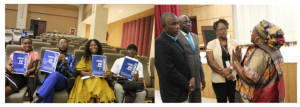The Ministry of Health through its Family Health Program has concluded a daylong stakeholder engagement meeting with members of the Liberian Senate and House of Representative committees on Health and other civil society organization in Monrovia.
The daylong event was marked by a panel discussion and testimonies of young people about the urgency to tackle adolescent health, and the rights of a woman and child to quality family planning.
Speaking at the start of the stakeholder’s engagement, Deputy Chief Medical officer, Dr. Gorbee Logan, called for a collective action in supporting the health of woman, adolescent and children in confirmative with the United Nations regulations on sustainable health.
Dr. Logan lauded members of the Liberian Legislature for their continued support to the healthcare delivery of Liberia, stressing the need for increased budgetary allocation for maternal and child health as required under the Sustainable Development goals (SDGs-2)
For her part, Bentoe Tehoungue, Director Family Health Division, provide an in-depth overview of childbearing choices and adolescent pregnancy prevention in Liberia, as well as give significant progress made in the attainment of quality services for maternal, adolescent and newborn health, amidst the mounting challenges towards the Family Planning (FP2020) commitment.
She also provided details on Liberia’s improvement in the score card linkages, key indicators, progress and challenges at major health facilities providing maternal care to enhance ‘safe delivery’ across Liberia.
On Liberia’s FP2030 Commitment, Madem Tehoungue, in line with the vision of the FP2020, stated that the Ministry of Health is working around the clock to ensure that ‘by the end of 2030, Liberia envisions a nation where everyone including adolescents, young people and those marginalized populations make informed choice, have equitable and affordable access to quality Sexual Reproductive Health and Rights (SRHR) including rights based family planning services that empowers them to fully participate in national development’.
The Family Health Program Director stated that as part of the strategy to obtaining the 2023 vision, the Ministry of Health will collaborate with partners to strengthen the delivery of quality rights-based adolescent and youth friendly family planning services targeting various age groups and demographics of adolescents and young people including those marginalized aimed at reducing unwanted pregnancy by 10% among adolescent girls by the end of 2030.
Madam Tehoungue stated that the Family Health Programme is currently working to scale-up three-access points model to provide adolescent and youth friendly services linking Health facilities services with primary and secondary schools and communities, including strengthening capacity to scale-up comprehensive sexuality education in primary and secondary schools.
She added that part of this process, the Fmaily Health program seeks to strengthen the capacity of young people themselves in higher learning institutions including local universities, colleges, and TVET programs to establish health clubs that integrate SRHR and Pregnancy Prevention awareness for young people to enhance capacity for mass media engagement to reach a wide range of populations with quality SRHR messaging including Family Planning targeting young people.
Madam Bentoe Tehoungue said they are considering expanding the scope of family planning champions by engaging Social Influencers and local entertainers in awareness of Adolescent and youth friendly SRHR services with the desire to promote positive communication with key community gate keepers (parents, Teachers, religious leaders, traditional leaders, and community leaders) to minimize stigma while promoting behaviors change.
Enhance capacity to promote positive masculinity among young people an adolescent as part of awareness on early parenthood prevention. For commitment II, (Private Sector Engagement), Mrs. Bentoe Tehnugue said it will ensure that the private sector capacity is strengthened to provide a broad range of contraceptive methods offered by trained personnel with reporting system in place to reflect quality data in the National Health Management Information System.
She said under this capacity strengthening, the Family Health Programme Shall Strengthen and broaden the Public-Private partnership in the delivery of quality family planning services in an effort to ensure access to a wide range of contraceptive methods through the private health facilities to enhance the capacity of private pharmacies and medicine stores personnel in the dissemination of standardized messages and basic counseling information on the correct use of FP products.
“We shall also strengthen the capacity of local CBOs, CSOs, leaderships of women and youth networks to integrate practices geared to changing norms to improve access to quality reproductive health including family planning to expand the current social marketing platforms and ensure a stable supply of mixed Family Planning products to Private Pharmacies and Medicine Stores and support training needs in high burdened communities. Full publication of the FP2020 COMMITMENT comes in our subsequent publication.

